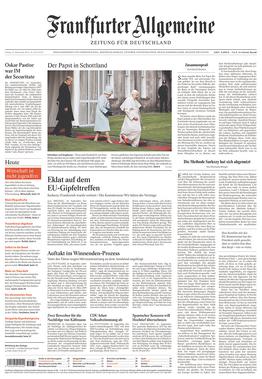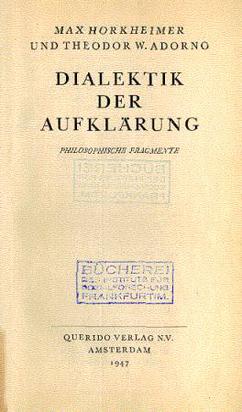
Theodor W. Adorno was a German philosopher, musicologist, and social theorist.

The Frankfurter Zeitung was a German-language newspaper that appeared from 1856 to 1943. It emerged from a market letter that was published in Frankfurt. In Nazi Germany, it was considered the only mass publication not completely controlled by the Propagandaministerium under Joseph Goebbels.

The Frankfurter Allgemeine Zeitung is a German newspaper founded in 1949. It is published daily in Frankfurt. Its Sunday edition is the Frankfurter Allgemeine Sonntagszeitung.

Goethe University Frankfurt is a public research university located in Frankfurt am Main, Germany. It was founded in 1914 as a citizens' university, which means it was founded and funded by the wealthy and active liberal citizenry of Frankfurt. The original name in German was Universität Frankfurt am Main. In 1932, the university's name was extended in honour of one of the most famous native sons of Frankfurt, the poet, philosopher and writer/dramatist Johann Wolfgang von Goethe. The university currently has around 45,000 students, distributed across four major campuses within the city.

Hermann Grab was a Bohemian German-language writer and musician.

Dialectic of Enlightenment is a work of philosophy and social criticism written by Frankfurt School philosophers Max Horkheimer and Theodor W. Adorno. The text, published in 1947, is a revised version of what the authors originally had circulated among friends and colleagues in 1944 under the title of Philosophical Fragments.
Félix José Weil was a German-Argentine Marxist and patron, who provided the funds to found the Institute for Social Research in Frankfurt am Main, Germany, the institute later originated the Frankfurt School.

Albrecht Wellmer was a German philosopher at the Freie Universität Berlin.
Eschenheimer Turm was a city gate, part of the late-medieval fortifications of Frankfurt am Main, and is a landmark of the city. The tower, which was erected at the beginning of the fifteenth century, is at once the oldest and most unaltered building in the largely reconstructed Frankfurter Neustadt, now better known as the Innenstadt.

The works of the German sociologist and philosopher Jürgen Habermas include books, papers, contributions to journals, periodicals, newspapers, lectures given at conferences and seminars, reviews of works by other authors, and dialogues and speeches given in various occasions. Working in the tradition of critical theory and pragmatism. Habermas is perhaps best known for his theory on the concepts of 'communicative rationality' and the 'public sphere'. His work focuses on the foundations of social theory and epistemology, the analysis of advanced capitalistic societies and democracy, the rule of law in a critical social-evolutionary context, and contemporary politics—particularly German politics. Habermas's theoretical system is devoted to revealing the possibility of reason, emancipation, and rational-critical communication latent in modern institutions and in the human capacity to deliberate and pursue rational interests.

The Frankfurt University Library is the library for the Goethe University Frankfurt, Germany.

Alexander García Düttmann studied Philosophy in Frankfurt as a student of Alfred Schmidt and in Paris as a student of Jacques Derrida.
Martin Lüdke is a German literary critic.
Frank Stähle was a German musician, a choral conductor and the director of Dr. Hoch's Konservatorium in Frankfurt from 1979 to 2007.

Batschkapp is a rock and pop concert venue in Frankfurt am Main. It is located in the warehouse district of the neighborhood of Seckbach, on Gwinnerstraße.

Alfons Rissberger is a German entrepreneur, business consultant, and writer.

Manuela Rottmann is a German lawyer and politician of the Alliance 90/The Greens who has been a member of the Bundestag from the state of Bavaria since 2017.
Michael Maaser is a German historian, archivist of the Goethe University Frankfurt.

Reinhard Kager is an Austrian philosopher, journalist and music promoter who also worked as a music producer.
Enrico Schleiff is a German biologist and physicist, and the president of the Goethe University Frankfurt, serving since 1 January 2021.















